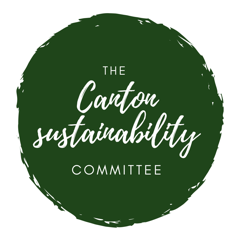Sustainability Corner: Holiday Packaging Waste
By GuestBrought to you by Canton’s Sustainability Committee
Holiday shopping season is upon us, and if past trends are any indication, we’ll be buying lots of gifts online again this year. Part of that has to do with COVID. Shopping from the safety and convenience of home has been a lifeline for many during the pandemic, spurring a massive growth in e-commerce sales. We’ve all heard (and perhaps even seen in our own town) the impact that online shopping has on local retailers. But have you ever noticed how much excess packing material comes with each of these purchases?
 Companies selling everything from televisions to toothpaste can package their products anyway they please. That often means multiple layers of plastic and cardboard, wrapped in more plastic and cardboard when we buy them online. Sadly, a lot of that packaging either can’t be recycled or simply gets tossed in the trash. Discarded shipping materials are straining municipal waste budgets. According to the Environmental Protection Agency, some 82.2 million tons of containers and packaging was thrown out in 2018, accounting for nearly a third of all municipal solid waste. Once China stopped buying recyclables from the U.S. several years ago, getting rid of our waste has becoming increasingly more expensive.
Companies selling everything from televisions to toothpaste can package their products anyway they please. That often means multiple layers of plastic and cardboard, wrapped in more plastic and cardboard when we buy them online. Sadly, a lot of that packaging either can’t be recycled or simply gets tossed in the trash. Discarded shipping materials are straining municipal waste budgets. According to the Environmental Protection Agency, some 82.2 million tons of containers and packaging was thrown out in 2018, accounting for nearly a third of all municipal solid waste. Once China stopped buying recyclables from the U.S. several years ago, getting rid of our waste has becoming increasingly more expensive.
Maine recently scored a victory in its battle against packaging waste when the governor signed the nation’s first so-called Extended Producer Responsibility (ERP) law. The law holds manufacturers accountable for their packing waste and has been described as “recycling reform.” According to a report in the Boston Globe, extended producer responsibility laws have been around in Europe and Canada for many years and have inspired global brands to redesign their packaging to comply. They’ve also helped boost recycling rates overall. Peter Blair, a staff attorney with the Conservation Law Foundation, told the Globe that the passage of ERP legislation would “shift the onus on the large companies that have a say in the packaging of these products for being financially responsible for recycling them.”
Smaller businesses are exempt from the law, yet critics worry that ERP will further disrupt supply chains and push the cost of compliance on to consumers. Nevertheless, interest in this sort of legislation is growing. A proposed bill here in Massachusetts (House No. 979) would establish extended producer responsibility for end-of-life consumer electronics. Until ERP laws become more widespread, though, we should all be more mindful of how much we’re buying … and how much we’re throwing away.
If you have a question about reducing household waste, or anything related to recycling, please email us at cantonsustainability@gmail.com.
Short URL: https://www.thecantoncitizen.com/?p=78991










